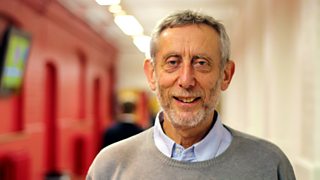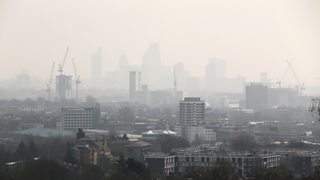How to fight climate change using language
In Word of Mouth, Michael Rosen is talking to George Marshall, the author of Don't Even Think About It: Why Our Brains Are Wired to Ignore Climate Change and the founder of Climate Outreach, which aims to engage people with climate change.
From “the greenhouse effect”, through to “global warming” and “climate chaos”, they discuss the best ways to communicate what's happening to our planet and why language and storytelling is crucial in the fight against global warming.
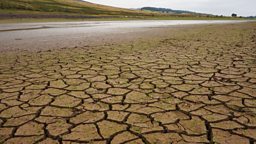
“Climate change” versus “global warming”
Interestingly, these two, common, competing phrases both appeared simultaneously in a scientific paper in 1975 – and we’ve been trying to work out which is best ever since.
However, because they both came from a scientific discourse, with no thought given to whether the language would help our understanding of the issue at hand, they both have weaknesses.
The university of Nottingham measured 35 different variants on carbon: carbon neutral, low-carbon lifestyles, and carbon footprint to name just three.
Climate change suggests something slow, gradual and managed – but we know we need to act fast if we want to halt it.
And global warming suggests it’s all to do with the planet getting hotter, whereas science tells us there might be all kinds of changes in weather and extreme variations.
What are the alternatives?
People have tried to introduce new core language like climate chaos, dirty weather, and global weirding, none of which have managed to usurp the two original monikers. One communication specialist even came up with the phrase atmospheric cancer, which barely saw the light of day (thankfully).
Climate crisis
The trouble with all these phrases, says George Marshall, is that they don’t adequately convey that this is something quite exceptional, and actually very dangerous. But it’s interesting to see that the language of climate crisis has really taken off.
The Guardian newspaper made an editorial decision that from now on they would refer to the climate crisis, and that appears to be gaining ground. Similarly, campaigners are also talking about climate emergency.
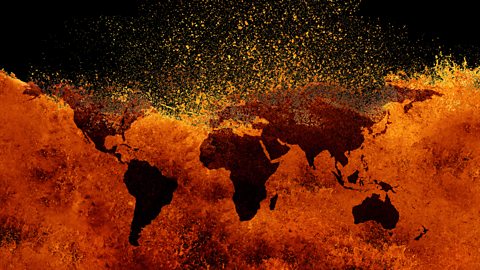
The truth about deaths from climate change
Does ‘the science’ predict six billion deaths by the end of this century?
Do we need to invent a whole new word?
When you have an issue of unprecedented crisis, such that you’ve never had to experience before, putting together these compounds of existing words doesn’t really cut it, says George.
We’re failing to communicate that this is something new and exceptional.
The author believes that as we move through the process, we’re going to have to invent some completely new words and labels.
Bad energy versus good energy
Fossil fuels: This is the generic term for the fuels that produce carbon pollution, which causes climate change. Fossil fuels are unique in that they can run out. The three main types are coal, petroleum and natural gas.
Renewables: A renewable energy source is one that is not depleted by use, such as water, wind, or solar power. The language of renewables is very valuable, says George: we have built into climate change a very helpful separation between dirty and clean, renewable and finite.
All things carbon
Just as carbon is a gas that loves to combine with other gases, it seems the word carbon is a word that loves to combine with other words. And it’s central to our dialogue around climate change (or should that be global warming?).
The university of Nottingham measured 35 different variants on carbon: carbon neutral, low-carbon lifestyles, and carbon footprint to name just three.
For a long time, President Obama was talking about carbon pollution, the idea being that some of the technical language around climate change was too hard to grasp and something more pithy might help.
The greenhouse effect
Unlike the phrase climate change, the greenhouse effect did come from a communications imperative. People wanted to find a way to easily explain how the world was warming up, and a greenhouse offered an effective metaphor.

Can we make carbon dioxide work for us, rather than against us?
Tom Heap talks to some scientists with some cunning plans.
The process is called the greenhouse effect because the exchange of incoming and outgoing radiation that warms the planet works in a similar way to a greenhouse. Gases in the atmosphere, such as carbon dioxide, trap heat just like a glass roof.
The tall task of language
The language around climate change has to do some serious heavy lifting.
The language we use has to speak to a person’s values and resonate with them.
We have no personal or shared experience to draw on about what climate change means, and so it’s asking language to do a lot.
Not only that, but we’re asking people to take action now to prevent something we’re anticipating will happen in the future – it can all feel quite abstract.
The language we use has to speak to a person’s values and resonate with them, says George. If it doesn’t, people will simply say, ‘I’ll deal with the problem when I see it.” But by then it will be too late.

Does going vegan radically reduce your carbon footprint?
Dr Tara Garnett talks to Dr Adam Rutherford about carbon emissions and diet.
The communicator of a message is often more important than the language
It’s also about who it is giving the messages. When we’re making decisions on an issue, we look to see whether we believe the person informing us, because when something is outside of our personal experience, we’re having to take it on their word. Trust therefore is key, and the communicator is often more important than the language used.
It’s a problematic issue, especially as we navigate deep polarisations in our society about who we trust and who we don’t. Environmental broadcaster David Attenborough is unusual because he is someone who manages to reach across these boundaries.
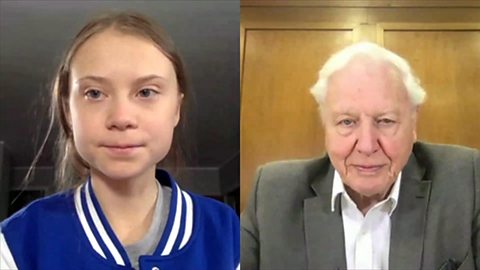
When Greta Thunberg met David Attenborough
Greta Thunberg and Sir David Attenborough discuss the climate crisis.
Pictures are as important as words
It’s not just about words, it’s about pictures too.
We can’t wait until people’s lives are directly affected because it will be too late.
Research shows that many of the visual images associated with climate change simply do not work.
The image of a polar bear sitting on a shrinking block of ice, and the language surrounding that image, all feels too far away and actually acts to distance us from an issue that affects us directly.
In order to get people engaged, they need to see that this is an issue that relates to them, their real lives and their real concerns.
The role of storytelling
We’re storytelling creatures who see the world through the medium of stories. There’s a clear narrative structure that appears in all cultures across the world: good versus evil, an ensuing struggle and, finally, resolution.
The trouble with climate change is that it doesn’t naturally lend itself to this structure. There is no good or bad guy – we are all the enemy. We are all the problem and we are all part of the solution.
We need to promote a narrative where we all come together and work collectively to achieve that happy ending. We have to find a way of creating compelling narratives that precipitate action, that make people feel a sense of shared purpose and identity. This is vital.
We can’t wait until people’s lives are directly affected because it will be too late.

Is it a waste of your money paying to offset carbon?
When you pay to offset carbon for your flight, what are you getting for your money?
More from Radio 4
-
![]()
Word of Mouth: Communicating Climate Change
Michael Rosen talks to George Marshall about the best ways to communicate what's happening to the planet.
-
![]()
10 things we learned when Greta Thunberg met David Attenborough
The Today programme brings Greta Thunberg and David Attenborough together via video call.
-
![]()
Seven things you can do to bring down pollution
What you can do to improve the quality of the air you breathe.
-
![]()
Will humans survive the century?
The experts investigating how to mitigate the giant risks we face.
